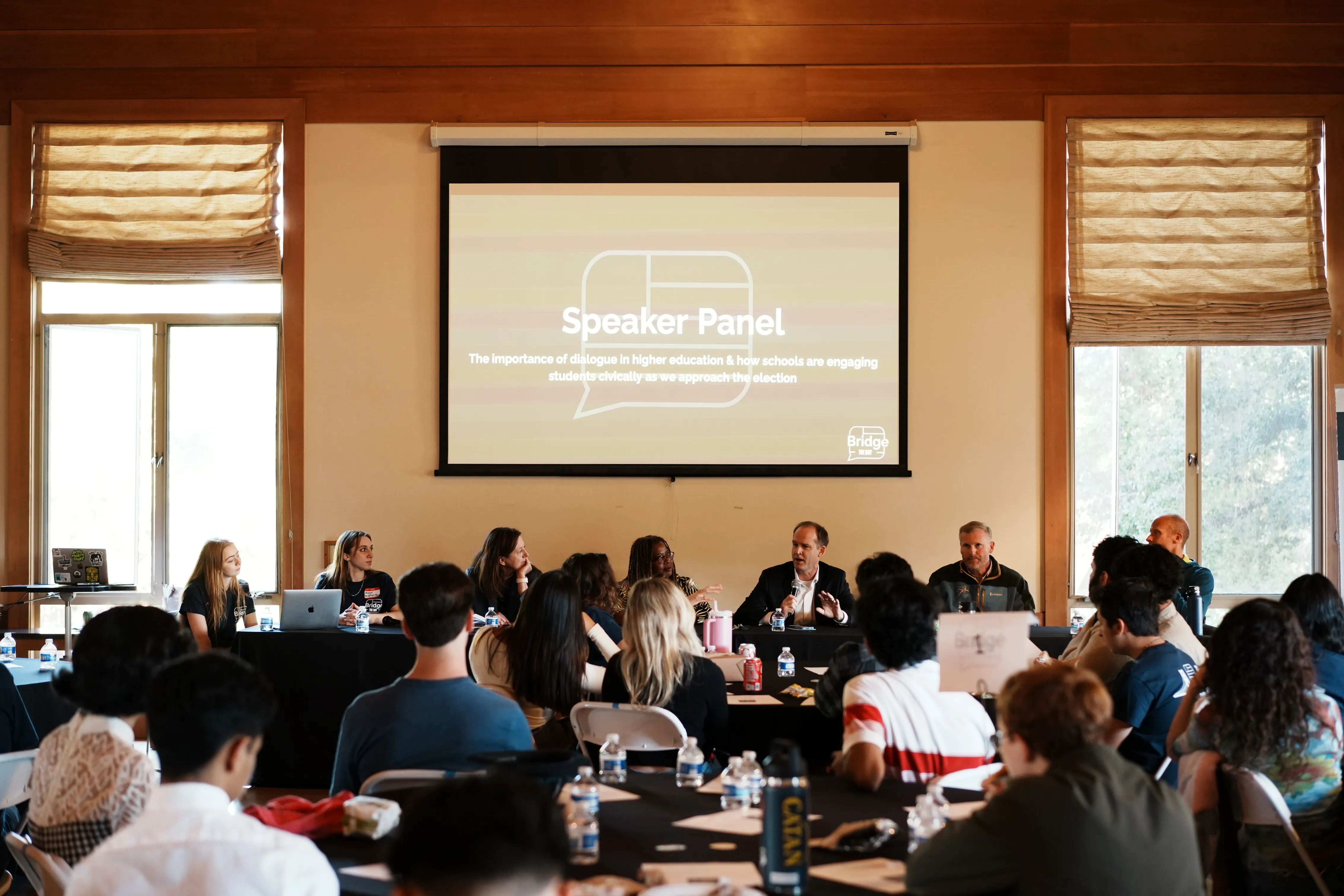College students, administrators and faculty from universities across the Bay Area engaged in constructive dialogue about election-related issues at a student-led event on campus Saturday.
Bridge the Bay, an event co-hosted by the Stanford Political Union (SPU) and BridgeUSA chapters from UC Berkeley, San Jose State University (SJSU) and Saint Mary’s College of California, featured student-driven dialogue and a speaker panel of administrators and faculty members from the participating schools. Students tackled hot-button issues like immigration, abortion and foreign policy in Ukraine and Gaza. A speaker panel focused on the importance of local and community-based civic engagement.
During the panel, Corey Cook, St. Mary’s College Executive Vice President and Provost, criticized partisan divisions and argued there was too much focus on the presidential election. The restoration of democracy emerges from local work that bridges political differences within a community, Cook said.
“The most meaningful thing you can do is restore our democracy by working with people on issues that you care about,” he said. “The real work is that very local level thing that students can do now because they can do it through their courses. They can do it through internships. They can do it through partnerships with the Haas Center.”
Cook also criticized universities for being too electorally focused, noting that higher education institutions “focus on these big electoral moments as what it means to be civically engaged,” he said.
Multiple panelists said student activists frequently struggle to understand a university’s power structures. They noted this leads to struggles in implementing changes in university policy and the tendency to attack individuals who have a “title” of institutional authority.
“Universities are really heavily controlled, in many respects, by their governance by faculty,” said Norman Spaulding, a professor at Stanford Law School. He added that student activists, with a “strategy that alienates faculty,” are unlikely to succeed in changing university policy.
Luke Terra, deputy director of the Haas Center for Public Service, said Stanford staff and faculty are often slow to create student spaces for community conversations and stressed the importance of celebrating student leadership. When asked how Stanford students could build or access communities of collaborative and coalitional change, Terra encouraged students to take advantage of resources provided by the Haas Center, such as speaking with peer advisors and participating in Cardinal Quarter.
“I think our students often feel that there are conversations that we — collectively, as a community — should be having, and that they don’t see offered around them,” Terra said.
BridgeUSA co-founder and Chief Development Officer Ross Irwin said he hoped students walked away from the constructive dialogue at the event with optimism. Irwin said universities were improving their efforts to facilitate constructive dialogue, but there was still work to be done.
“I think if we really want to create a culture of respectful disagreement on campuses, it will have to come from both the bottom — from the students — and from the top — from the admin, from the professors,” Irwin said, “so that all places on campus are places for constructive, respectful disagreement, and they’re not just events like this that have to kind of carry a lot of that load.”
BridgeBerkeley President Samantha Dalton, a UC Berkeley student who co-organized the event, agreed that universities could do more but stressed the importance of student-led conversations free from faculty influence.
“I think what it really comes down to is students also having that space separately to engage in that dialogue without someone sitting over your shoulder,” Dalton said.
Attendees said the event provided a respectful environment and exposure to diverse viewpoints.
“I think it was a really great event,” Colin Weis ’28 said. “It absolutely did highlight different viewpoints.”
SJSU student Chima Nwokolo and Berkeley student Lucy Cox both said they appreciated the event.
“I think most of the tables had a lot of really good questions to ask, and weren’t afraid to ask some of the controversial questions,” Cox said. “Even though some of us may be self-identified liberals or conservatives, we did find a lot of common ground on things that I wasn’t really expecting us to find common ground on.”
